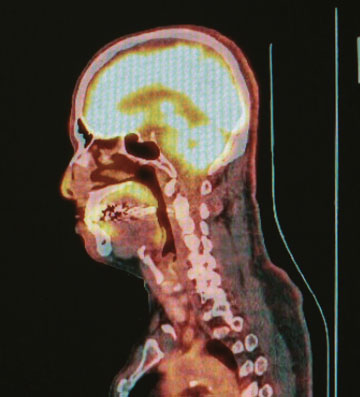Breadcrumb
The brain is the command center of our bodies, the origin of our dreams and plans. Not only is the brain responsible for our thoughts, it also sends instructions to nerves throughout our bodies, controlling our muscles and movements. It is central to our very existence. Unfortunately, our brains aren’t always perfectly wired machines, and our muscles sometimes fail us, no matter who we are or what our circumstances may dictate.
The University of Missouri is home to some of the best neuroscientists in the world. Soon, they’ll call the NextGen Precision Health building home, coming together with researchers and clinicians under one roof to change the face of health care in Missouri and around the globe.
Mizzou-Made Excellence
 The University of Missouri confronts the challenges of brain, neurological and muscular disorders with specialized facilities and skilled experts. But it takes more than individual minds to change the world.
The University of Missouri confronts the challenges of brain, neurological and muscular disorders with specialized facilities and skilled experts. But it takes more than individual minds to change the world.
As a state, nation and world, we face unprecedented challenges that require solutions that stretch beyond what we previously thought possible. Addiction takes both a personal and societal toll. Our brave veterans disproportionately deal with post-traumatic stress disorder, which can lead to substance abuse. Afflictions such as Lou Gehrig’s Disease and muscular dystrophy take the lives of our loved ones daily. A multitude of neurodegenerative disorders such as Alzheimer’s, multiple sclerosis, stroke and Parkinson’s affect millions of Americans and citizens all across Missouri each day. These are realities we can no longer accept.
Unique Strengths on One Campus
 Cutting-edge research is critical to solving the grand challenges facing neuroscience and lessening the suffering inflicted by neurological and muscular disorders. But no one discipline has all the answers we need, which is why Mizzou is leveraging and unifying its strengths in animal modeling, engineering, psychology and more to tackle addiction, neurodegenerative and neuromuscular disease, motor deficits, sleep disorders and other critical brain health issues.
Cutting-edge research is critical to solving the grand challenges facing neuroscience and lessening the suffering inflicted by neurological and muscular disorders. But no one discipline has all the answers we need, which is why Mizzou is leveraging and unifying its strengths in animal modeling, engineering, psychology and more to tackle addiction, neurodegenerative and neuromuscular disease, motor deficits, sleep disorders and other critical brain health issues.
Imagine a treatment for Parkinson’s, ALS or multiple sclerosis that addresses the specific biology and needs of an individual patient to maximize their quality of life. Envision an addiction treatment plan tailored to your brain chemistry, or that of someone you love, rather than gambling on a broad-brush approach. See a future where the pain of PTSD is alleviated by clinical, therapeutic or pharmaceutical solutions that are chosen based on what will work best for an individual, their environment and lifestyle.
Helping More People, Faster
This reality is closer than you think. MU’s world-class scientists, such as Dr. Chris Lorson and Dr. Dongsheng Duan, are working to develop therapies for spinal muscular atrophy and Duchenne muscular dystrophy, their respective specialties. These genetic diseases gradually weaken children, often leading to death. Both Dr. Lorson and Dr. Duan are working hard to get these exciting therapeutics into the clinic. The innovative nature of the NextGen building means that initial animal testing can rapidly proceed to clinical trials in humans, because of the continuous collaborative work happening all in the same facility. This integrated structure is unique among medical campuses around the country, and ensures NextGen’s goal of allowing clinicians to rapidly develop novel therapeutics that help families now, not in some distant future.

In another recent breakthrough, researchers from the University of Missouri and the Thompson Center for Autism and Neurodevelopmental Disorders successfully shortened the Wechsler Intelligence Scale for Children (WISC) test to a new version, the WISC-V, which maintains accuracy in determining a child’s IQ. The previous version took more than an hour to complete. This new version helps clinicians get the information they need while making life easier on the many children with special needs who have a difficult time participating in such long tests.